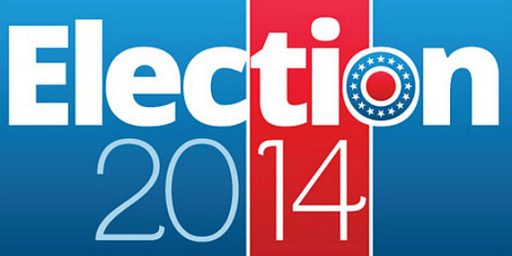The Midterm Elections Will Be Over In 13 Days. Or Will They?
There's at least a 50-50 chance we won't know who controls the Senate until weeks after Election Day.
FiveThirtyEight’s Harry Enten hits on an issue that I’ve brought up before, namely that it is increasingly likely that we may not know who controls the Senate until some point well after November 4th:
Republicans are 66 percent favorites to win a Senate majority, according to the latest FiveThirtyEight Senate forecast. New polls confirmed GOP advantages inArkansasandColorado, and a generic ballot surveyfrom AP-GfK found Republicans up 8 percentage points — an unusually large lead.
But — as I’ve written before — there’s a good chance we won’t know who controls the next Senate when the sun rises on Nov. 5. We may have to wait, as we did for the 2000 presidential election. But not because of hanging chads and the Supreme Court. With a possible runoff in Georgia, a probable runoff in Louisiana and the specter of independent Greg Orman in Kansas taking his sweet old time deciding whom to caucus with — not to mention potential recounts— the 2014 midterms may remain unresolved until you’re shopping for Christmas presents (or even making New Year’s resolutions).
Enten goes on to address the scenarios that are likely to contribute to uncertainty on Election Night. At the top of the list, of course, is the possibility that we’ll see runoffs that won’t take place until December and January, thus leaving the status of those races up in the air for four to eight weeks. Louisiana, for example, seems almost certain to go to a runoff. That state has a non-partisan “primary” election on Election Day and, if no candidate gets more than 50% of the vote, then a runoff will be held on December 6th. Presently, neither Senator Mary Landrieu nor her strongest opponent Congressman Bill Cassidy are polling anywhere near 50% and it seems unlikely that either on of them will get to that mark before Election Day. Right now, Cassidy leads Landrieu in a head-to-head match up, but it’s worth noting that the runoff election will be held on a Saturday, which should help Landrieu drive African-American voters to the polls, and that it is scheduled for the same day as the SEC Championship Game, which may end up reducing turnout. Given those factors, a Louisiana runoff would likely be a complete toss-up. We may also see a runoff election in Georgia, where neither Michele Nunn nor David Perdue have been able to break through the 50% barrier thanks in part to the presences of Libertarian Party candidate Amanda Swafford on the ballot and the fact that polling still shows undecided voters as being as high as seven to eight percent of those polled. If that continues, then a runoff in that case would be held on January 6th, after Congress has already returned to session. Depending on how the night ended on Election Day, either or both of these states could be crucial to deciding Senate control and we may not know who controls the Senate until after Congress has returned.
Another factor that could throw the issue of Senate control into doubt are the presence of strong Independent candidates on the ballot in two states. In Kansas, Greg Orman continues to poll strongly against Senator Pat Roberts, although Roberts has most assuredly closed the gap from where it was back in September. In South Dakota, former Republican Senator Larry Pressler polled strongly against Republican Mike Rounds and Democrat Rick Weiland in polling conducted earlier this month, but there haven’t been many updates to polling out of that state in more than a week now. Neither Orman nor Pressler have made it clear who they would caucus with if they were to win election, although their Republican opponents have both tried to make the implication that Orman and Pressler would definitely caucus with the Democrats, which is obviously a smart strategy in two states that are strongly Republican. If either Orman or Pressler, or both, managed to win, they would likely have the balance of control of the Senate in their hands. Given the fact that Angus King of Maine has hinted that he could be persuaded to switch allegiances in the new Congress, the three of them together could have a lot of control over what the Senate looks like in the 114th Congress, and it could be weeks before that particular question is answered.
The final factor that could delay final determination of who controls the Senate, of course, is the possibility that one or more of ten or so states that are currently considered toss-ups, meaning that they are polling within the margin of error, will be so close that they will trigger state laws authorizing mandatory or discretionary recounts that could take weeks or months, and which could be followed by lawsuits that drag out the process even longer. To pick just one example, it took some seven months for the 2008 Senate race in Minnesota between Al Franken and Norm Coleman to be resolved thanks to disputes over valid ballots and, in the end, other issues that turned out to be somewhat meritless. It’s probably not likely that we’ll see a repeat of that ordeal in 2015, but given how close many of these races are one can rest assured that both parties will have armies of poll watchers and lawyers on Election Day ready to call out supposed irregularities and ready, if necessary, to take legal action after Election Day. In some states, these disputes will likely be resolved quickly depending on what state law says, but the results in other states could be delayed until there’s a final resolution of disputes over ballots in the case of election results that end up being a hair’s breadth apart.
So, how likely is it that any, or all of this will happen? To start out with, of course, that depends on what the Senate map looks like immediately after Election Day. If the GOP or the Democrats have a clear majority in the immediate aftermath of Election Day, then the outcome in these disputed cases won’t matter at all. If, as seems more likely, neither party has won enough seats to put together a 50 seat majority at that point, then we’ll have to play the waiting game. Enten crunches the numbers and finds that its nearly a 50-50 chance right now:
As of Tuesday’s model run, there is a 53 percent chance we’ll be able to project Senate control near Nov. 4; 47 percent of the time, the midterms go to overtime. It’s basically a coin flip.
Republicans have a 38 percent chance of securing the majority near Nov. 4. Democrats have only a 15 percent chance.
It’s possible this calculation underestimates the chances we’ll know the winner within a day or two of Election Day. In 2008, it took two weeks for Sen. Mark Begich to be declared the winner in Alaska. His margin of victory was small but not that close. He won by just over 1 percentage point. It’s not hard to imagine that even a 2 percentage point or 3 percentage point victory could take a while to finalize in Alaska. Republican Dan Sullivan is projected to win Alaska by about 4 percentage points.
If we assume we won’t know Alaska right away, the chance of a regulation-time win for either party falls to 36 percent — 64 percent of the time, we’re left waiting (without a call in Alaska, the GOP wins in regulation 24 percent of the time, and the Democrats win and avoid overtime in 12 percent of simulations).
The GOP’s most likely path to regulation-time victory includes sweeping Alaska, Arkansas, Montana, South Dakota and West Virginia. FiveThirtyEight currently has Republicans with at least a 75 percent chance of winning in each of these states.
The GOP would also need to win three of the following five states: Colorado, Georgia, Iowa, Kansas and Kentucky. FiveThirtyEight has Republicans as 74 percent favorites in Colorado, 65 percent in Iowa and 78 percent in Kentucky. Results in these states are correlated, but not enough to make Republicans favorites to sweep all three. FiveThirtyEight also forecasts that Georgia is more likely than not to go to a runoff, and that Orman has a 54 percent chance of winning in Kansas.
So, right now there’s a 50-50 shot that we won’t know who won the Senate in the immediate aftermath on Election Day, and at least a fair chance that we might not know for up to two months afterward. You thought this was going to be over in thirteen days? Oh, silly, silly you.







It’s truly weird to have laws requiring runoffs in the general election given that we’ve traditionally operated a First Past the Post electoral system here, with the plurality vote getter declared the winner. The Louisiana “It’s a primary! And it’s a general election!” system is even weirder.
@James Joyner:
Runoffs are, of course, almost exclusively a creature of states in the South and at least some of the history I’ve read on the matter suggests that they were implemented in no small part to diminish Republican, and African-American, political power in elections by preventing someone who could win a plurality, but not a majority, in a given election, would not be victorious. I’m not sure how accurate that actually is, but given the geographic distribution of the states where runoff elections have existed, its not entirely implausible.
As for Louisiana’s system I am reminded of something a law professor once said — 49 of the 50 states have legal systems that are basically the same, but Louisiana is different for reasons that only Louisianans seem to understand.
@Doug Mataconis: I thought it was because it was originally based on the Napoleonic Code vs English Common Law. But that is just a distant academic memory.